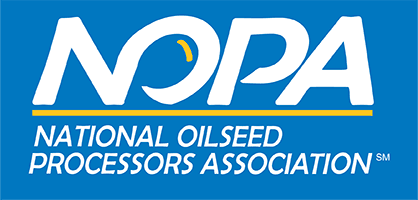NOPA Calls for California to Recognize Benefits of Advanced Biofuels; Urges More Scrutiny of Imported Feedstocks
WASHINGTON, Feb. 20, 2024 – The National Oilseed Processors Association (NOPA) today urged the California Air Resources Board (CARB) to support the role of agriculture in diversifying the fuel supply and reducing greenhouse gas (GHG) emissions.
In comments submitted in response to CARB’s proposed Low Carbon Fuel Standard (LCFS) amendments, NOPA outlined that fuels produced and certified under the national Renewable Fuel Standard (RFS), including Biomass-Based Diesel (BBD), already meet CARB’s newly proposed sustainability criteria and should be recognized as compliant with the LCFS amendments. NOPA also encouraged CARB to further scrutinize imports of Used Cooking Oil (UCO).
“CARB should simultaneously promote sustainability and maintain the cost and health benefits afforded by Biomass-Based Diesel (BBD) by recognizing that fuels certified under the federal Renewable Fuel Standard (RFS) meet CARB’s newly proposed sustainability criteria.
“While we recognize and support the need for low carbon and waste-based feedstocks, NOPA encourages CARB to undergo additional scrutiny and monitoring of imported feedstocks. Such actions will ensure continued program confidence and compliance.
“A vibrant U.S. oilseed sector, and the advanced biofuels produced from oilseeds, are critically important to lowering the GHG emissions in the United States’ and California’s fuel supply. Efforts to undercut current policies regarding eligible feedstocks will significantly and negatively impact investments being made in lower carbon feedstocks and fuels,” wrote NOPA President and CEO Kailee Tkacz Buller.
A recent Life Cycle Assessment (LCA) jointly commissioned by NOPA and the United Soybean Board (USB) shows the carbon footprint for U.S. soybeans decreased 19 percent from 2015 – 2021.
NOPA members are committed to improving environmental outcomes, making significant investments to produce sustainable vegetable oil supplies to meet all the demands of biofuel, feed, and food customers. The industry has announced more than $6 billion in soybean crushing capacity investments since 2021 and is on track to increase soybean crush capacity by over 30 percent between 2023-2026. Collectively, these projects will provide enough additional feedstock to support a one billion gallon increase in BBD capacity over the next several years, without impacting food or land use.
Read NOPA’s Comments to CARB
About National Oilseed Processors Association (NOPA):
Founded in 1930, NOPA is the national trade organization located in Washington, DC representing the U.S. soybean, canola, flaxseed, safflower seed, and sunflower seed crushing industries. Our 15 members operate a total of 62 soybean & 5 softseed solvent extraction plants across 21 states. NOPA members produce meal and oil used in human food, animal feed, fuel and for industrial applications. Collectively, NOPA members process 95 percent of all soybeans in the U.S. which accounts to over 2 billion bushels annually. For more information on NOPA, visit www.nopa.org.
###

